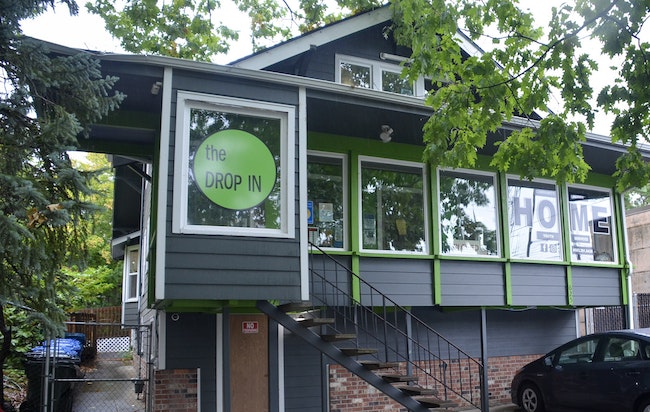
The HOME Youth and Resource Center on Union Street Northeast (Rachel Alexander/Salem Reporter)
Tricia Frizzell said youth that run away from home, are alone and don’t have a place to sleep are vulnerable to being taken advantage of by traffickers.
The program director for HOME Youth Services, which serves homeless youth in Salem, said by the third time they run, they are significantly more likely to be trafficked within 48 hours of leaving home.
With a new federal grant which allocates $150,000 per year for three years, Frizzell said her program wants to better support homeless and runaway youth so they’re not taken advantage of on the streets.
She said they’ve applied for the highly competitive grant each year since 2014, but this is the first time they’ve been successful.
Jimmy Jones, executive director of the Mid-Willamette Valley Community Action Agency, said there are a certain number of awards given out per region and only about 30 total awarded each year.
“It’s just a reflection of the emerging maturity of the homeless system locally that we’re able to grab onto to some of this stuff now,” he said.
The money will help pay for two full time employees and one part-time employee to do street outreach, going to different homeless camps and hot spots in Marion and Polk counties and building relationships and trust with youth at risk.
Frizzell said increasing the number of staff means they’ll be able to go out more hours per week.
She said they work with police to better track reports of youth running away and prioritize those who have multiple incidents. Then through street outreach, she said they can try to prevent them from running away again.
If they have been involved in trafficking, the program is working with nonprofit Safety Compass to advocate for those victims.
Safety Compass, founded in 2016 and based in Silverton, offers support for victims of sex trafficking and free, confidential advocacy.
Esther Nelson-Garrett, CEO of Safety Compass, said they often serve as a bridge into other systems like social services or criminal justice.
She said they often find their clients because they’re called out by police, the Department of Human Services or emergency room staff.
The nonprofit serves 350 to 450 people each year in Marion, Clackamas and Washington counties, primarly under the age of 25.
She said unhoused people are extremely vulnerable to being trafficked.
“We know in doing interviews with female youth and young adults who are unhoused, the vast majority would say a precursor to lack of housing was domestic violence, trafficking or some form of family violence,” she said.
Nelson-Garrett said people who are trafficked and those who are houseless have “mirrored trauma histories.”
She said Safety Compass was founded by a trafficking survivor and offers culturally specific care through its eight advocates.
That means advocates have lived experience and expertise in trafficking.
“If you have never lived any life connected to it can be hard to understand,” she said.
The funding will also allow the HOME program, which is part of the Mid-Willamette Valley Community Action Agency, to buy a 12-passenger van and transport youth to services, like the drop-in center in downtown Salem.
“We’ll be able to take more services into rural areas because we’ll have a vehicle for it,” she said.
She said Community Action has done street outreach for years, but it’s been pretty minimal.
Frizzell said a much smaller portion of youth experiencing homelessness are on the street compared to adults. They’re more likely to be couchsurfing.
About 10% of the 2,000 students attending public school in Marion and Polk counties identified as homeless in 2019-2020.
Advocates connect with partners in schools, but also get creative.
She said they’ve done a lot of social media outreach, combing through posts to pick up red flags and connect with those youth.
Frizzell said the federal Department of Health and Human Services funding comes with extensive training that’s only available grant winners.
She said that will give them access to national best practices and innovative approaches to youth homelessness.
Contact reporter Saphara Harrell at 503-549-6250, [email protected].
JUST THE FACTS, FOR SALEM – We report on your community with care and depth, fairness and accuracy. Get local news that matters to you. Subscribe to Salem Reporter starting at $5 a month. Click I want to subscribe!









